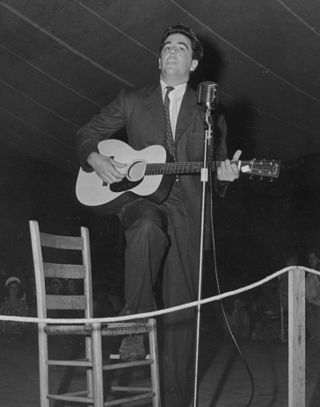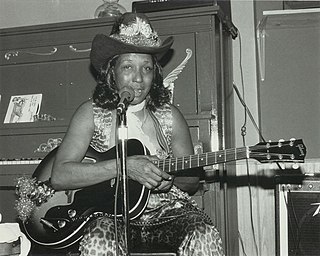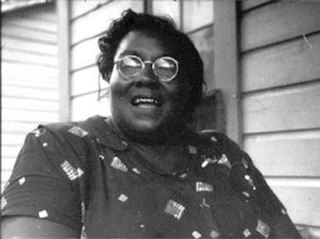Related Research Articles

Blind Willie McTell was a Piedmont blues and ragtime singer and guitarist. He played with a fluid, syncopated fingerstyle guitar technique, common among many exponents of Piedmont blues. Unlike his contemporaries, he came to use twelve-string guitars exclusively. McTell was also an adept slide guitarist, unusual among ragtime bluesmen. His vocal style, a smooth and often laid-back tenor, differed greatly from many of the harsher voices of Delta bluesmen such as Charley Patton. McTell performed in various musical styles, including blues, ragtime, religious music and hokum.

Robert Leroy Johnson was an American blues musician and songwriter. His landmark recordings in 1936 and 1937 display a combination of singing, guitar skills, and songwriting talent that has influenced later generations of musicians. Although his recording career spanned only seven months, he is recognized as a master of the blues, particularly the Delta blues style, and as one of the most influential musicians of the 20th century. The Rock and Roll Hall of Fame describes him as perhaps "the first ever rock star".

Delta blues is one of the earliest-known styles of blues. It originated in the Mississippi Delta and is regarded as a regional variant of country blues. Guitar and harmonica are its dominant instruments; slide guitar is a hallmark of the style. Vocal styles in Delta blues range from introspective and soulful to passionate and fiery.
Country blues is one of the earliest forms of blues music. The mainly solo vocal with acoustic fingerstyle guitar accompaniment developed in the rural Southern United States in the early 20th century. It stands in contrast primarily to the urban blues style, especially in the pre-war era.

Alan Lomax was an American ethnomusicologist, best known for his numerous field recordings of folk music of the 20th century. He was a musician, folklorist, archivist, writer, scholar, political activist, oral historian, and film-maker. Lomax produced recordings, concerts, and radio shows in the US and in England, which played an important role in preserving folk music traditions in both countries, and helped start both the American and British folk revivals of the 1940s, 1950s, and early 1960s. He collected material first with his father, folklorist and collector John Lomax, and later alone and with others, Lomax recorded thousands of songs and interviews for the Archive of American Folk Song, of which he was the director, at the Library of Congress on aluminum and acetate discs.

Booker T. Washington "Bukka" White was an American Delta blues guitarist and singer.

Willie Lee Brown was an American blues guitar player and vocalist. He performed and recorded with other blues musicians, including Son House and Charlie Patton, and influenced Robert Johnson and Muddy Waters. Brown is considered one of the pioneering musicians of the Delta blues genre.

Jessie Mae Hemphill was an American electric guitarist, songwriter, and vocalist specializing in the North Mississippi hill country blues traditions of her family and regional heritage.

Jean Ruth Ritchie was an American folk singer, songwriter, and Appalachian dulcimer player, called by some the "Mother of Folk". In her youth she learned hundreds of folk songs in the traditional way, many of which were Appalachian variants of centuries old British and Irish songs, including dozens of Child Ballads. In adulthood, she shared these songs with wide audiences, as well as writing some of her own songs using traditional foundations.

Adell Hall Ward, better known as Vera Hall, was an American folk singer, born in Livingston, Alabama. Best known for her 1937 song "Trouble So Hard", she was inducted into the Alabama Women's Hall of Fame in 2005.
"That's All" is a 1952 song written by Alan Brandt with music by Bob Haymes. It has been covered by many jazz and blues artists. The first recording, by Nat King Cole in 1953, achieved some popularity but was not among that year's top 20 songs. It was Bobby Darin's version from his 1959 album of the same title that introduced the song to a wider audience, and it has since become a jazz standard.
"Rock Island Line" is an American folk song. Ostensibly about the Chicago, Rock Island and Pacific Railroad, it appeared as a folk song as early as 1929. The first recorded performance of "Rock Island Line" was by inmates of the Arkansas Cummins State Farm prison in 1934.
"Children, Go Where I Send Thee" is a traditional African-American spiritual song. Among the many different versions of the song, a defining feature is the cumulative structure, with each number accompanied by a biblical reference. Today, many Americans know it as a Christmas carol.
"Inside-Looking Out", often written "Inside Looking Out", is a 1966 single by the Animals, and their first for Decca Records. It was a moderate hit, reaching number 12 on the UK Singles Chart, number 23 in Canada, and number 34 in the United States on the U.S. pop singles chart. It was the group's final single with drummer John Steel, who left shortly after its release. He was replaced by Barry Jenkins, who would go on to play with Eric Burdon and the Animals.
Georgia Turner (1921–1969), was an American folk singer. She is credited with an early recording of "Rising Sun Blues", produced by Alan Lomax in 1937, in Middlesboro, Kentucky. Her adaptation of this American folk classic, better known as "House Of The Rising Sun," has become the standard, the ancestor of covers by hundreds of later performers, including Dave Van Ronk, Bob Dylan, The Animals, Joan Baez, Tracy Chapman, Muse, and even Andy Griffith.
"The House of the Rising Sun" is an American traditional folk song, sometimes called "Rising Sun Blues". It tells of a person's life gone wrong in the city of New Orleans. Many versions also urge a sibling or parents and children to avoid the same fate. The most successful commercial version, recorded in 1964 by the British rock band The Animals, was a number one hit on the UK Singles Chart and in the US and Canada. As a traditional folk song recorded by an electric rock band, it has been described as the "first folk rock hit".
"Boll Weevil" is a traditional blues song, also known by similar titles such as "Boweavil" or "Boll Weevil Blues". Many songs about the boll weevil were recorded by blues musicians during the 1920s through the 1940s. However, a rendition by Lead Belly recorded in 1934 by folklorist Alan Lomax led to its becoming well-known. A 1961 adaptation by Brook Benton became a pop hit, reaching number two on the Billboard Hot 100. Fats Domino's "Bo Weevil" is a different song.
Anna Lomax Wood is an American anthropologist, ethnomusicologist and public folklorist. She is the president of the Association for Cultural Equity (ACE), established in 1985 by her father, musicologist Alan Lomax, at Hunter College, CUNY.

Sid Hemphill was an American blues multi-instrumentalist and bandleader who played in his own string band mainly in Mississippi. He recorded for Alan Lomax in 1942 and again in 1959.
The Southern Journey is the popular name given to a field-recording trip around the Southern States of the US by ethnomusicologist Alan Lomax. He was accompanied on the trip by his then-lover, English folk singer Shirley Collins. It resulted in the first stereo field-recordings in the Southern United States and the "discovery" of Mississippi Fred McDowell. The music collected on the trip has had a significant impact on the development of popular music. Tracks recorded on the trip were sampled by Moby for his album, Play. It also served as the inspiration for the soundtrack to the Coen Brothers' film, O Brother Where Art Thou. The Southern Journey is the subject of an autobiography by Shirley Collins entitled America Over the Water. It is also the subject of s 2017 feature documentary, The Ballad of Shirley Collins. Lomax's own recollections of the trip were documented in his autobiography, The Land Where Blues Began, which won the National Book Award for Nonfiction in 1993.
References
- ↑ "FAME Review: Various Artists – Alan Lomax: Blues Songbook". Acousticmusic.com. n.d. Retrieved August 28, 2010.
- ↑ Evans, David (2003). The Blues Songbook (Media notes). Alan Lomax. Smithsonian Folkways.